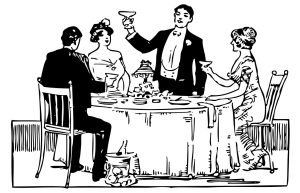Inside the Lawyer’s Mind Part 4: Sociability
 In parts 1 to 3 of this series we discussed the three traits that lawyers score particularly high on in personality assessments: skepticism, autonomy, and urgency. In this post and the next we look at two traits that lawyers score low on: sociability and resilience. In some ways, these are the most surprising findings.
In parts 1 to 3 of this series we discussed the three traits that lawyers score particularly high on in personality assessments: skepticism, autonomy, and urgency. In this post and the next we look at two traits that lawyers score low on: sociability and resilience. In some ways, these are the most surprising findings.
The average lawyer scores on the bottom 12% on measures of sociability, according to lawyer/psychologist consultant Dr. Larry Richard. This trait measures a person’s desire to meet new people and make new friends. A low score means that a lawyer is uncomfortable going in cold in social situations. He is slow to warm up to people, but happy in his existing network of colleagues, friends, and family.
In a service oriented profession it is surprising that we score so low on sociability. We would expect to score high as we often meet new clients. The interaction between lawyer and client is often complex and emotionally fraught, sometimes starting from the first interview. While less sociable lawyers may have perfectly capable social skills, most lawyers apparently prefer not to exercise them with new people.
On the other hand, lawyers place a premium on intellect or “book-smarts.” The law requires long and careful study which precludes social interaction. It appears a preference for, or success in the one, is often to the exclusion of the other.
Possessing a high level of sociability is rewarding. Dr. Richard looked at the difference between rainmakers, those lawyers in the top echelon in terms of developing new business, and service partners, those in the bottom echelon for developing new business but still highly reputed as lawyers. His research found that rainmakers scored nearly three and a half times higher on sociability than service partners.
Within the law firm, the low-sociability senior lawyer can appear unwelcoming to new lawyers and staff. This poses a problem to growing firms and firms that suffer from high turnover. If employees do not feel welcome because a well-respected senior lawyer in the firm gives them the cold shoulder, that is a problem that needs to be addressed.
As with any kind of change, knowing where we stand on the continuum of traits is the first step. This self-awareness allows for concrete but simple changes in behaviour – such as making it a point to say hello to new hires on a regular basis. Small changes in behaviour can lead to big gains.
In my next post we will discuss where lawyers land on resiliency.
See the other posts in this series:
- The Average Lawyer Is 90% More Skeptical Than Everyone Else: what this means for your clients, your colleagues, and your firm.
- Inside the Lawyer’s Mind Part 2: Autonomy
- Inside the Lawyer’s Mind Part 3: Urgency
- Inside the Lawyer’s Mind Part 4: Sociability
- Inside the Lawyer’s Mind Part 5: Resilience
- Inside the Lawyer’s Mind Part 6: Managing Our Traits

Leave a Reply